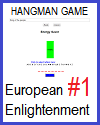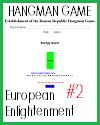Games can be an effective and engaging tool for helping high school World History students understand the European Enlightenment. This period, marked by complex philosophical ideas and political theories, can be challenging for students to grasp through traditional lectures alone. Educational games bring these abstract concepts to life by encouraging active learning and critical thinking.
Role-playing games, for example, allow students to take on the personas of key Enlightenment thinkers like Voltaire, Rousseau, or Locke. By debating issues such as natural rights, the social contract, or freedom of religion in character, students gain a deeper understanding of the arguments and motivations behind each philosophy. Strategy-based games can simulate how Enlightenment ideas influenced political revolutions, allowing students to make decisions that reflect real historical consequences.
Interactive digital games or classroom activities that involve matching ideas with thinkers, timelines, or reforms can reinforce knowledge and improve retention. Games also foster collaboration and discussion, creating a more dynamic learning environment where students learn from one another.
Ultimately, games help students move beyond memorization. By placing them in historical scenarios or challenging them to apply Enlightenment concepts, games make learning more meaningful and enjoyable, while highlighting the enduring relevance of Enlightenment ideals in modern democratic societies.
|


















































